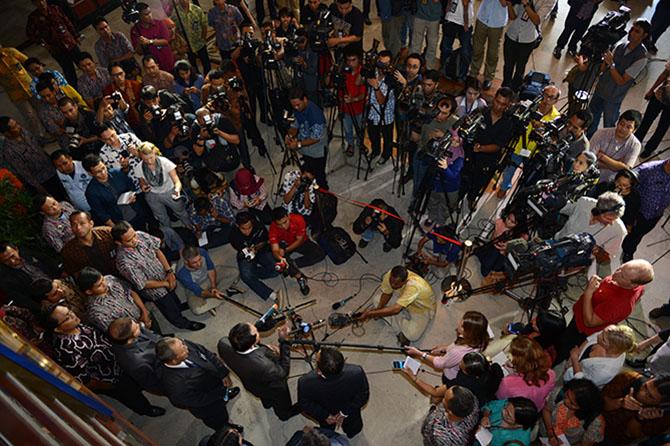
In January 2014, the ABC reported claims (accompanied by photographs) that asylum seekers attempting to come to Australia by boat had their hands burned by Australian Navy personnel. The claims, which were emphatically denied by the head of the Navy, were also broadcast to the Asia–Pacific region on the ABC’s Australia Network service and then made their way into local reporting in the Indonesian news media. During the “burned hands” saga, Abbott said that it “dismays Australians” when the ABC as the “national broadcaster appears to take everybody’s side but our own.” Immigration Minister Scott Morrison described ABC’s coverage of the incident as the “sledging” of Australian Navy personnel, which should not be tolerated. In response, the ABC partly backed down, with its managing director, Mark Scott, publishing a statement on Feb. 4 that expressed “regret if our reporting led anyone to mistakenly assume that the ABC supported the asylum seekers’ claims.”
The reporting of this incident and its diplomatic fallout occurred at a time when government officials were becoming more vociferous in their threats of cuts to ABC funding. Foreign Minister Julie Bishop had claimed that the Australia Network was not fulfilling its role in the Australian government’s foreign policy objectives as a “tool of public diplomacy” and in “meeting the goal of promoting Australia’s interests overseas.” In a speech to Chatham House in London in early March, Bishop shed light on the reasoning behind her concerns: “My question is whether or not there is an inherent conflict in having the ABC contracted to deliver Australian government messages into the region. We’ve had conflict writ large when it comes to the issue of asylum seekers and the issue of the Snowden allegations. The ABC is a news organization and perfectly entitled to report how it wishes into the region on those two contentious issues. But under a soft power diplomacy contract, it’s meant to be delivering a positive image of Australia into the region.”
In the lead-up to the 2014 budget, a government-funded Commission of Audit report recommended that funding for the Australia Network be ceased, which was accepted. Australia Network’s $223 million budget (over 10 years) was cut. At the time, it was broadcasting in 46 different countries. In response, ABC International’s chief executive officer, Lynley Marshall, declared that the cuts “could not be justified on performance alone,” citing the important partnerships with media companies in Indonesia and China. Those advocating for an independent news service that represented Australia’s interest in the Asia-Pacific by promoting its brand of fearless, independent news were ultimately left disappointed. Content-sharing arrangements still continue between Australia Plus, the ABC and Indonesian counterparts, but the fallout from the spying scandal and the “burned hands” story meant expanding on existing arrangements was not encouraged with vigor by the ABC or the Australian government.
The death penalty
Just when it seemed that Indonesia-Australia relations could not get any lower, Indonesia in January 2015 began executing the first of 64 death row drug convicts, all but a handful of them foreigners. The second round of executions, carried out last April, included two Australians, Myuran Sukumaran and Andrew Chan. Indonesia’s media is largely very free, and since the country’s transition to democracy began in 1999, journalists have been able to comment on and criticize government policies. Yet there were very few newsrooms critical of President Joko’s new hard-line approach to drug trafficking, which was executing condemned drug convicts en masse. There was also only mild interest in uncovering stories of the individuals due to be executed, including the Indonesian nationals among them.







%20resized.png)
